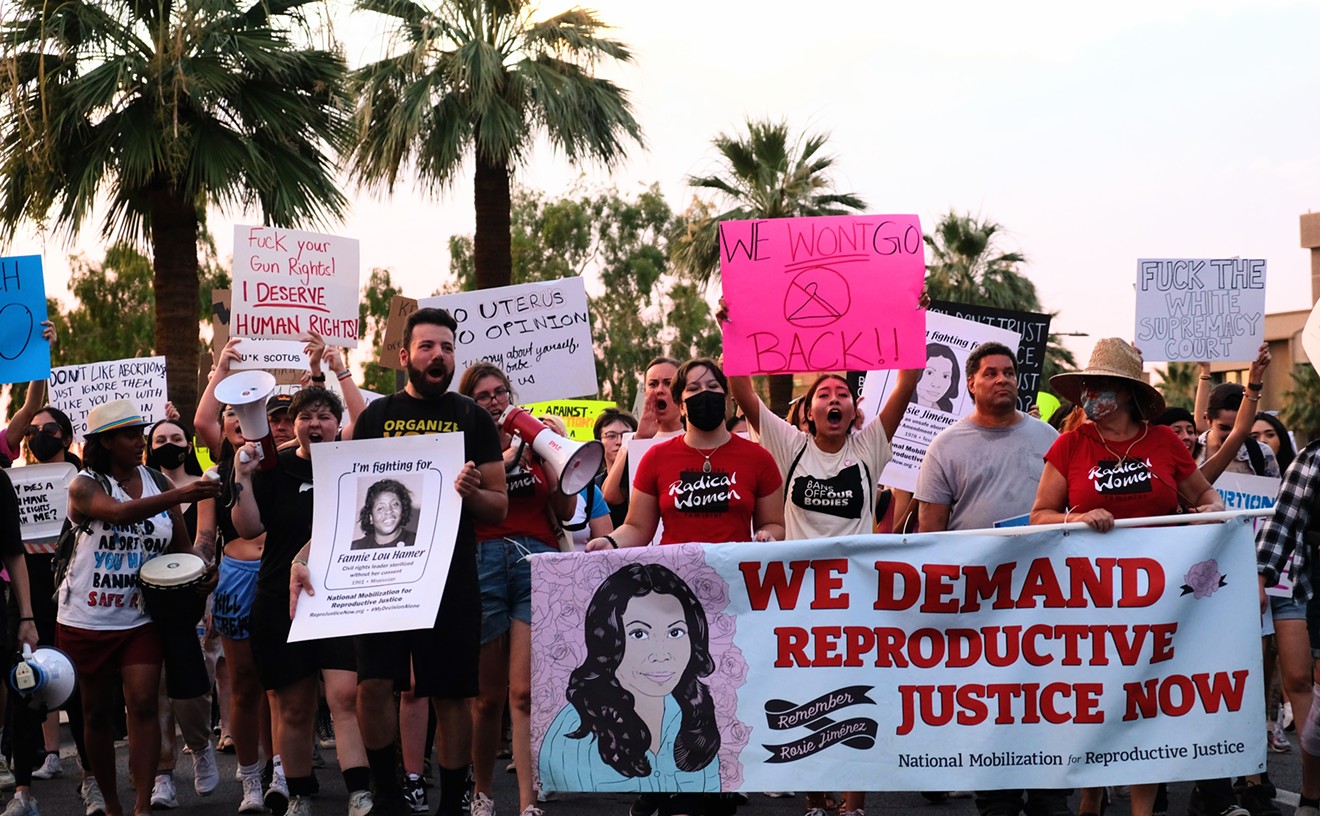It's only been a few days since surgeons removed his cancerous prostate gland, and the last thing the recently retired and highly decorated Arizona Department of Public Safety narcotics officer wants to do is launch into a full guffaw.
But stretched across his bed in his new west Valley home recently, Thrasher alternately laughs and grips his lower stomach as his freshly sliced abdomen pulls against stitches.
"Goddammit, you're killing me!" Thrasher yells as he repeats two more excruciating laughing jags.
Thrasher's laughter is spurred by questions about his first meeting with Phoenix businessman Marvin R. Weide, former chairman (1993-97) of the Maricopa County Republican Party and current commander of Maricopa County Sheriff Joe Arpaio's 400-member Executive Posse.
Their chance meeting occurred under most unusual circumstances. The encounter left Thrasher amused and disgusted and the normally loquacious Weide quiet.
It's not Weide's nature to embrace silence, especially when the topic is the war on drugs.
Weide was among the first to endorse a much-ridiculed 1993 Arpaio scheme to place a dragnet around Maricopa County's borders to search incoming vehicles for illegal drugs.
"I think the community has just about come to the point where everybody wants to be a part of ending this drug scene," Weide told a Phoenix daily newspaper at the time. "I think the mood is right for it [the checkpoints]. We're going to take our streets back. And I think we're going to take them back in every area."
Despite Weide's enthusiasm, the plan, which appalled constitutionalists, never got off the ground.
But that didn't curb Weide's verbal swagger. In January 1995, Weide bragged in a Village Voice article that he and his fellow posse members had donned their Clint Eastwood chaps and were going to rid the Phoenix streets of dopers and whores.
"What we say to these people is the posse is out on the streets and we're here to fuck you up," Weide is quoted as saying.
These days, Weide is in no mood to dispense antidrug hyperbole.
"Well, I'm not real anxious to talk to you," Weide tells New Times before hanging up the phone. He also refused a second telephone request for an interview and declined to reply to a letter faxed to his home.
Weide's reticence is understandable.
That's because a sprawling North 40th Street warehouse his family owns and that he uses for an auto-parts business, as a posse operations base and reelection campaign center for Arpaio was for 21 months an integral link in what federal authorities allege is one of the largest marijuana importation and distribution enterprises ever.
Federal records and interviews reveal that Weide's warehouse was among at least three sophisticated distribution centers operated by Glen Moore Rice Jr., possibly the biggest American marijuana dealer in history.
Rice was captured on February 17 in a Dallas hotel room. The next day, Otis Thrasher and U.S. Customs Service criminal investigators searched Weide's warehouse and found an "obvious marijuana processing warehouse site" capable of processing thousands of pounds of marijuana at a time, according to federal court records.
Thrasher met Weide moments after entering the warehouse and would interview him several times during the next few days. Despite his posse training and rank, Weide denied then, and continues to deny now, any knowledge of the drug operation even though he conducted business operations and assembled Arpaio campaign signs in another part of the same warehouse.
Thrasher says he found no evidence linking Weide to the dealers, but is astounded that Weide did not recognize that something was amiss--especially since Weide was receiving $4,100 a month in rent from a supposed furniture business that never had more than a handful of cheap couches in stock and operated primarily at night.
Thrasher says Weide's responses to questions left him with a low opinion of Arpaio's top posse man.
"Weide is a bum!" Thrasher says with a chuckle before instinctively grabbing his aching stomach.
After chasing 51-year-old Glen Moore Rice for 15 years, federal narcotics officers finally got a break last winter.
The ease of the arrest and the carelessness of Rice and his alleged accomplices make one wonder how they remained fugitives for so long while allegedly importing hundreds of tons of marijuana into the United States.
Federal attorneys in Waco, Texas, tracked Rice and his gang for years. They allege that Rice's organization made massive shipments of marijuana from Mexico to the East Coast, and smuggled millions of dollars in cash into Texas by truck and on commercial airliners, and then on to Mexican marijuana suppliers.
"Understand something," says assistant U.S. attorney Jake Snyder in a telephone interview from his Waco office. "I'm not joking when I say this is the largest gringo weed dealer in the world."
Rice, who looks more like a country preacher than marijuana kingpin, made a mistake when he met his Mexican wife, Guadalupe Quiroz, in Dallas last February. The U.S. Customs Service already knew that Quiroz had entered the country. Now, they were waiting for her to leave.
On February 17, Quiroz arrived at Dallas-Fort Worth International Airport to catch a flight to Mexico. She was accompanied to the airport by James Earnest Gregory, a Rice lieutenant who authorities allege headed up Rice's drug distribution centers in Phoenix and Dallas.
U.S. marshals detained Quiroz--apparently without Rice or Gregory knowing--as she tried to board the aircraft. The marshals questioned Quiroz and obtained receipts and information from her giving the name and location of a Lewisville, Texas, hotel where she had been staying.
Federal agents went to the hotel, a Homewood Suites Inn, and learned that Rice, who was using Gregory's name, had been asked to check out of the hotel several days earlier because of suspicious activities, including making numerous phone calls from the lobby.
Rice, however, apparently liked the room, and gave the hotel a business telephone number and told the clerks to contact him there if a room became available.
The hotel clerk gave the federal agents the phone number, which they traced to a large warehouse in Dallas.
Deputy U.S. Marshal Randyl Kruid noticed another hotel across the highway. Kruid went to the Marriott Residence Inn and showed the staff a photo of Rice.
Kruid hit the jackpot.
The hotel staff said Rice, again using Gregory's name, was registered at the hotel and had been paying for his room in cash. Kruid and U.S. Treasury Special Agent Steve Pennington staked out Room 105 and waited.
They didn't have to wait long. Federal records indicate that about 11:30 a.m., Rice, with Gregory driving, pulled into the hotel parking lot and went to their room. Federal agents gave Rice and Gregory about two minutes before they approached the room.
According to an affidavit by Irving police officer David Carmical, Rice and Gregory were not obsessed with security.
"As they [federal agents] approached the room, they noticed the door was standing open and they noticed a maid's cart outside. They walked to where they could see inside the room and they saw two persons sitting at a small table talking on a phone.
"They [Rice and Gregory] were involved in a very animated conversation on the phone. Both parties were involved in the conversation.
"They [federal agents] also saw a brief case open on the floor, just below the table. . . . and they could see bundles of money. They could determine there were at least stacks of hundreds and fifty dollar bills."
There's no mention of where the maid was, but Carmical testified the federal agents believed the telephone conversation was of "a business nature."
Gregory and Rice apparently didn't notice the two men standing outside their room ogling what turned out to be $34,500 in cash and eavesdropping on their conversation. Agents then moved in and arrested Gregory and Rice, who were both unarmed, without incident.
A pat-down search of Gregory revealed 1.5 ounces of marijuana in a coat pocket.
The investigation shifted to the Dallas warehouse where Rice had told the Homewood Suites clerk to contact him. Investigators took a drug-sniffing dog to the warehouse, and, according to a federal prosecutor, the dog went bonkers.
Investigators found 9,031 pounds of marijuana in the warehouse, which was leased in Gregory's name. In addition, investigators found two oceangoing cargo containers that contained an air compressor and a vacuum sealer allegedly used to shrink-wrap bales of pot.
After his arrest, Gregory gave investigators permission to search a Dallas house he was leasing.
"At that location, they recovered several different types of drug notes, drug ledgers, which indicated narcotics transactions and also approximately $446,000 in cash, U.S. currency," Carmical testified.
Rather than fight drug charges that could have resulted in life in prison, Gregory quickly capitulated and on March 3 pleaded guilty to one count of intent to distribute marijuana. He was sentenced to six years in federal prison in June after agreeing to provide the government "substantial" information in its case against Rice and others. Gregory, who is serving his sentence at a federal detention camp in California, declined to be interviewed for this story.
Rice is jailed in Waco pending his March trial.
One of the concessions Gregory provided included permission to search a Phoenix warehouse Gregory leased from--and shared with--Marvin Weide, commander of Arpaio's executive posse.
James Gregory told federal agents Rice gave him $60,000 to set up a drug distribution warehouse in Phoenix. Gregory said he began leasing a portion of Marvin Weide's warehouse at 1625 North 40th Street in June 1995, for $4,100 a month.
Gregory, 51, apparently was unconcerned that Weide was a member of the sheriff's posse and that marked sheriff's cruisers frequently were parked around the warehouse.
In fact, Thrasher says Gregory welcomed the prominent police presence. Apparently, he was more concerned about rival drug dealers stealing his stash than Arpaio's Executive Posse discovering one of the biggest marijuana smuggling operations on Earth.
"How would you feel if you had a humongous drug operation going on and doing tons of marijuana and you had all these police cars sitting out in front of your place? Wouldn't you feel a certain amount of comfort?" Thrasher asks before answering his own question.
"I would. I would feel wonderful. Nobody is going to think anything is going on with all those sheriff's cars parked right there."
Gregory told investigators that Helmut Pauwells, a Mexican national who illegally entered the United States, worked with him and handled day-to-day activities at Weide's warehouse, according to an affidavit by a Texas Department of Public Safety narcotics officer Robert B. Nesteroff filed in U.S. District Court in Phoenix.
The drug-processing operation allegedly was located at the south end of the warehouse, approximately 150 feet from the main entrance to Weide's business, UTE Parts Supply.
The search of the warehouse revealed three large oceangoing shipping containers--one 40-foot-long container and two 20-footers. The containers were screened off from the rest of the cavernous warehouse by a makeshift, eight-foot-high sheetrock wall that did not reach to the ceiling.
"Inside one of the twenty foot containers were numerous items used for the packaging and distribution of large amounts of marijuana," including 20,000 packets of deodorizer sheets, Nesteroff's affidavit says.
Other items found inside the warehouse, according to an Arizona Department of Public Safety report, included an electronic scale that could be used to weigh marijuana, 60 rolls of plastic shrink wrap, 10,000 plastic bags, 120 duffel bags and high-grade tools. Police also found a semitrailer with a false front parked in front of the warehouse doors and a steel roller conveyor system leading to Gregory's cargo containers.
While no marijuana was found during the search of the warehouse, U.S. Customs Special Agent Judy Colter testified during Pauwells' detention hearing that the distinctive odor of marijuana was present inside the shipping containers.
Colter was asked by Michael Gordon, a federal public defender representing 22-year-old Pauwells, whether the operation "was obviously a marijuana processing site to someone like yourself who had dealt with law enforcement and drug enforcement law?"
"Those items are commonly used for processing or handling marijuana, correct," Colter responded.
Colter's assessment and that these materials were found on Weide's property have failed to make much of an impression on Weide, who occasionally wears an Arizona Narcotics Officers Association belt buckle and drives around in a sport utility vehicle equipped with a police radio and sheriff's posse emblems.
In a brief interview before he hung up, Weide told New Times there was no indication that his warehouse was used for marijuana storage and distribution.
"I don't think that there was ever any evidence of that. I know DEA was interested and they didn't find anything," Weide says.
"They didn't find anything?"
"No."
"You're saying DEA didn't find anything in the warehouse?"
"There was no evidence of anything found," Weide says.
There was certainly enough evidence, however, for federal agents to arrest Pauwells and for U.S. District Magistrate Morton Sitver to detain Pauwells before transferring him to Waco, where he awaits trial along with Rice, each on seven narcotics and conspiracy charges.
By late November, Otis Thrasher is back on his feet and rambling around his home. He's feeling up to a more detailed interview concerning the search of Marvin Weide's warehouse. He describes the episode as one of the most unusual of his 27-year career as a DPS narcotics officer.
Thrasher says he had no idea who Weide was when he and Colter first entered the warehouse with search warrants. Thrasher says he learned of Weide's connection to the Sheriff's Office from business cards found in Weide's office, which was adjacent to Gregory's.
Weide's initial reaction to the search was one of disappointment and shock, Thrasher recalls.
"He was concerned, worried about the loss of the income," Thrasher says of the $4,100 Weide was receiving monthly from Gregory.
The rental income appears to be a very healthy lease for the seedy warehouse located among a mishmash of apartments and retail strip malls around 40th Street and McDowell Road.
Thrasher says Gregory appeared to use only a relatively small portion of the warehouse for the marijuana packaging and distribution center. Most of the warehouse, Thrasher says, was filled with empty shelves.
Despite the compact area used by Gregory, Thrasher says it took most of the day of February 18 to conduct an inventory of the materials found in and near the three cargo containers. Thrasher's formal interrogation of Weide didn't begin until the next day.
Thrasher says Weide told him that Gregory was running a furniture business and frequently put large numbers of couches in front of his warehouse for sale.
Thrasher says Weide also confirmed that he and other posse members were making Arpaio campaign signs for the November 1996 election in the north end of the warehouse, a stone's throw from Gregory's alleged drug operation. At least one Arpaio campaign sign was posted on a fence outside the warehouse when Thrasher first arrived. It was removed the next day, Thrasher says.
Thrasher says he's amazed that no one ever detected marijuana moving in and out of the warehouse--especially since so many people trained in basic police operations frequented the building.
"You would have to be awfully stupid" not to detect any smell from the amount of marijuana that apparently was being shipped, Thrasher says. Gregory "admitted that they used that warehouse for a number of months to actually do packaging and shipping" of marijuana, Thrasher says.
There is no publicly available estimate, however, of how much marijuana was processed in Weide's warehouse.
Thrasher says he became concerned about some of Weide's responses to questions when he examined the couches Gregory supposedly was selling.
"There were only two or three couches" in the warehouse, Thrasher says. Furthermore, they were of poor quality, "like you find along the streets and in Park 'N' Swap."
Raising further questions in Thrasher's mind were statements made by one of Weide's auto-parts employees. Eric Ukner, according to federal court records, told investigators he remembered only two occasions when Gregory had couches for sale. And Thrasher says Ukner told investigators that only a few couches were displayed for sale. Ukner declined to be interviewed for this story.
"There's a lot of difference between somebody bringing out two or three couches and 50 or 60," Thrasher says.
The couches, Thrasher says, may have been used to conceal marijuana during shipments.
"I was surprised that he [Weide] hadn't seen indicators himself, that something was wrong there," Thrasher says. "Here's a guy that's paying $4,100 [monthly rent] and has got very little business. When he has a sale, it's just a few couches . . . and most of the traffic happens at night."
Thrasher claims Weide attempted to scavenge property in Gregory's portion of the warehouse. He says Weide initially claimed that Gregory had given a couch to Weide's son.
"When we actually sat down and interrogated him, it turns out that he [Weide] told us that he was just trying to make up for his losses. That he actually had not been given the couch."
Thrasher says Weide also initially claimed to own a camper shell that was found near the cargo containers.
"He lied to me initially about the couch. He lied about a camper shell--that it was his. He actually, initially laid claim to damn near everything that was in there," Thrasher says.
Thrasher says after the crime scene was secured and Weide knew that authorities believed it was a marijuana-smuggling operation, Weide ordered an employee to steal.
"[He] had his secretary go in and literally clean out all the office supplies out of Gregory's office," Thrasher says.
When Thrasher discovered the next day that the office had been rifled, he confronted Weide.
"Weide says, 'We'll put everything back. We will do whatever you want done.' Because now he's scared. He's now worried because he knows now he's messed up," Thrasher says.
"Here's this guy, he's supposed to be commander of the damn sheriff's posse. . . . He went in there and parted him out, for God's sake," Thrasher says. "That's what he did. He went in there and parted him out."
Despite Weide's questionable behavior, Thrasher says no report was filed with the Sheriff's Office nor was Weide ever considered a suspect.
"He wasn't a suspect; he was a weasel," Thrasher says.
"There wasn't any kind of internal complaint or anything like that because there really wasn't anything we could do," Thrasher says. "How do you complain about stupidity?
"But there was more than stupidity," Thrasher says. "Marv went in and stole. I don't care how you word it, but when you go in and take possession, somebody else's possessions that don't belong to you, you're stealing."
As the debriefing continues, Thrasher's irritation with Weide's actions turns to questions.
"There were a lot of things about him that bothered me," Thrasher says. "If you look at his statements, they conflict with the other employees as to how many couches. What would be his reasoning?
"Why would he want to make it look like the guy had a legitimate business?
"Was he saying to himself, 'I screwed up, and now I have to try to legitimize this guy in my own mind'?"
These questions can only be addressed by Weide, who declines to be interviewed.
Thrasher says there was no point in referring Weide's actions to the County Attorney's Office for possible prosecution.
"It's hard enough to get a complaint if you have got an iron-clad case, much less if you have got a friend of [former Governor J. Fife] Symington's and Arpaio's and everybody else in the county," Thrasher says.
It was more a question of integrity, than criminal conduct, Thrasher says.
"I saw Weide as a greedy little man who probably didn't care who was in there as long as he made his $4,000 a month," Thrasher says.
"That's not to say . . . that he would have gone along if he had known there was a drug-smuggling operation going on. I don't think he took much care to find out if there was something going on."
The final chapter in the Weide warehouse saga remains to be written.
Gregory is expected to provide key testimony when Rice goes on trial in Waco. Evidence at the trial may shed more light on Gregory's contacts with Weide and reveal the amount of marijuana processed through Weide's warehouse.
There is also a possibility that federal prosecutors may invoke racketeering statutes and seek to force Weide to forfeit about $80,000 in rent received from Gregory.
"If they [prosecutors] want to ratchet it up, they could go after the money," says Phoenix criminal-defense attorney Marc Budoff. "If they think he was just dumb and greedy, maybe they don't want to confuse their case and go after him."
Repercussions stemming from Weide's close ties with the sheriff's department are also a possibility. Weide already has come under scrutiny for his role in creating the Sheriff's Posse Foundation. The nonprofit foundation has come under fire for its shoddy accounting of more than $400,000 in sales of Arpaio's pink underwear and questionable campaign activities.
Now Weide has to explain to posse members and deputies alike how a major drug-smuggling operation was run out of a warehouse he uses as a posse field office and for Arpaio's political endeavors.
The episode won't enhance the reputation of the Executive Posse, which has boasted among its members former governor and bank-fraud artist J. Fife Symington III and alleged bookies and Asian gang members Kenny and Tom Tat.
The Sheriff's Office did not respond to a public-records request for files related to Weide, nor did Arpaio respond to a written request for an interview to discuss the marijuana-smuggling operation being conducted out of Weide's warehouse.
While Weide and his friends in the Sheriff's Office lay low, there are indications that federal investigators are still poking around in Phoenix.
Assistant U.S. Attorney Jake Snyder traveled from Waco to be in Phoenix when Thrasher, Colter and others searched Weide's warehouse. Several days after the February search, Snyder described Weide's warehouse connection as "bizarre."
Nine months later, Snyder was still wondering about Weide's warehouse in the context of Rice's huge drug-smuggling operation.
"That's a real curiosity for us," Snyder said in a November interview.
And it is a question that appears to have stirred up some continuing interest, at least at the federal level, Snyder says.
"The matter is still under real heavy investigation."










